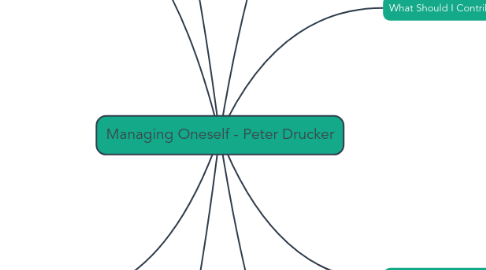
1. Managing Oneself
1.1. Throughout history the majority of people were not responsible for managing themselves. They were told what to do.
1.2. Now most of us need to learn to manage ourselves
1.2.1. Decide where we can make a contribution
1.2.2. Figure out how to stay mentally alert
1.3. This means knowing how and when to change the work we do
2. What Are My Strengths?
2.1. Most people think they know what they are good at. Usually they are wrong. More often people know what they are not good at. But even then more people are wrong than right.
2.2. Feedback Analysis
2.2.1. This is the only way to truly find your strengths
2.2.2. Process
2.2.2.1. 1. Make a key decision or take a key action
2.2.2.2. 2. Write down what you expect will happen
2.2.2.3. 3. 9 - 12 months later compare your results to your expectations
2.2.2.4. 4. Repeat for 2-3 years and learn where your strengths and weaknesses are
2.2.2.5. 5. Take action by playing to your strengths and working on your weaknesses
2.2.2.6. 6. Look for where your arrogance is causing you harm and work to overcome it
3. How Do I Perform?
3.1. Most people don't know how they get things done. So they tend to work in ways that are not best for them.
3.2. Like your strengths the way you perform is unique and based on personality
3.3. Are you a reader or listening?
3.3.1. Most people are one or the other
3.3.2. Look at your past experiences to figure it out
3.3.3. Most people cannot change from one to the other so it's best to play to your strengths
3.4. How do you learn?
3.4.1. Most schools, trainings and courses are organized around one way of learning
3.4.2. There are probably a half dozen different ways to learn
3.4.2.1. Doing
3.4.2.2. Hearing Yourself Talk
3.4.2.3. Teaching
3.4.2.4. Writing
3.4.2.5. Etc..
3.5. Other performance questions to ask yourself
3.5.1. Do you work best on a team or alone?
3.5.2. Are you a decision maker or an adviser?
3.5.3. Do you perform well under stress?
4. What Are My Values?
4.1. What kind of person do you want to see in the mirror in the morning?
4.2. What is the most important to you?
4.3. Fast Growth vs Slow Growth
4.3.1. Neither is better or worse economically. But there are people who are better suited for one or the other.
5. Where Do I Belong?
5.1. Very few people choose their careers early in life. Most people don't really know where they belong until after their mid twenties
5.2. By that time though you should be able to answer the previous questions and then you can work to decide where you belong
5.2.1. What are my strengths?
5.2.2. How do I perform?
5.2.3. What are my values?
5.3. Successful careers are not planned they develop when people are prepared for opportunities because they know their strengths, their method of work and their values.
6. What Should I Contribute?
6.1. Answer these three questions
6.1.1. What does the situation your in require?
6.1.2. Given your strengths, way of performance and values how can you make the greatest contribution?
6.1.3. What results have to be achieved to make a difference?
6.2. Plans can usually cover no more than 18 months
6.2.1. Think about your goals within that timeframe
6.2.2. Where and how can your achieve a result that will make a difference in the next year and a half?
6.2.2.1. Make sure you're trying to "stretch" but keep them within reach
6.2.2.2. Make sure the results your aiming for a meaningful
6.2.2.3. Make sure the results are meaningful and measurable
7. Responsibility For Relationships
7.1. Other people are individuals
7.1.1. They have strengths
7.1.2. They have ways of getting things done
7.1.3. They have values
7.2. Other people need to know about you
7.2.1. Your strengths
7.2.2. How you work best
7.2.3. Your values
7.3. You must take responsibility for communicating these things with people
7.3.1. They will be thankful you tell them as it will help them work with you
7.3.2. They will be more likely to let you play to your strengths
8. The Second Half Of Your Life
8.1. Midlife crisis's are mostly an effect of boredom
8.1.1. After 20 years of working at the same job people aren't stimulated or growing any longer
8.1.2. The secret to curing this is a second career
8.1.2.1. Moving from one organization to another
8.1.2.2. Developing a parallel career
8.1.2.3. Starting a business in coaching/consulting based on your strengths
